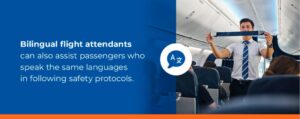
In a global industry where airlines must ensure their services run smoothly with passengers’ safety in mind, communication in more than just English has become advantageous. Employers in all sectors look for staff who speak languages other than English. Bilingual employees give their employers a competitive edge in their industry and often have better communication, problem-solving, decision-making, and multitasking skills.
航空会社のような乗客の安全を第一に考え、サービスを円滑に運営しなければならないグローバルな業界では、英語だけではないコミュニケーションが有利に働くようになっています。あらゆる分野の雇用主が、英語以外の言語を話すスタッフを求めています。バイリンガルの社員は、雇用主にその業界での競争力を与え、多くの場合、より優れたコミュニケーション能力、問題解決能力、意思決定能力、マルチタスク能力を備えています。
In the airline industry, bilingualism impacts various aspects of operations, contributing to the success of your airline in a competitive market. This post discusses the role of language proficiency and the benefits of bilingual language skills among the flight crew.
航空業界において、バイリンガルは運航の様々な側面に影響を与え、競争の激しい市場における航空会社の成功に貢献します。この記事では、言語運用能力の役割と、客室乗務員のバイリンガルの利点について説明します。
An Overview of the Airline Industry(航空業界の概要)
Airlines serve passengers worldwide who speak different languages. Pilots and air traffic controllers work together with complex technology and communication devices to execute the safe take-off, flying, and landing of aircraft. The International Civil Aviation Organization (ICAO) requires flight crew to have a certain level of English language training.
航空会社は、異なる言語を話す世界中の乗客にサービスを提供しています。パイロットと航空管制官は、航空機の安全な離陸、飛行、着陸を実行するために、複雑な技術と通信機器を駆使して協力しています。国際民間航空機関(ICAO)は、乗務員に一定レベルの英語訓練を義務付けています。
Being proficient in English, including an aeronautical vocabulary, is necessary to help flight crew and other aviation professionals communicate effectively and understand each other during flights. Regardless of their nationality, the crew must be able to comprehend technical terms and phrases, procedure manuals, and different interfaces.
乗務員や航空関係者が飛行中に効果的にコミュニケーションを図り、互いを理解し合うためには、航空用語も含めた言語運用能力に長けていることが必要です。国籍に関係なく、乗務員は専門用語や言い回し、手順書、さまざまなインターフェースを理解できなければなりません。
However, being bilingual has advantages. As most airlines facilitate operations in international markets, hiring bilingual workers allows them to decrease linguistic and cultural gaps while expanding their reach.
しかし、バイリンガルであることには利点があります。ほとんどの航空会社が国際市場での運航を促進しているため、バイリンガルの労働者を雇うことで、言語的・文化的ギャップを減らしつつ、航空会社の活動範囲を広げています。
The Role of Language Proficiency in Aviation(航空業界における言語運用能力の役割)
According to an Administrative Sciences report published in 2021, second language skills are of above-average importance in aviation, especially for flight attendants. Many airlines are increasingly requiring bilingualism as part of their recruitment criteria. Within an international cabin crew, you may find people speaking different languages and dialects. Language proficiency in more than one language can have multiple benefits for an airline.
2021年に発表されたAdministrative Sciences reportによると、航空業界、特に客室乗務員にとって、第二外国語のスキルは平均以上の重要性を持っています。多くの航空会社が、採用基準の一部としてバイリンガルを求めるようになってきています。国際的な客室乗務員の中には、異なる言語や方言を話す人がいるかもしれません。複数の言語運用能力があれば、航空会社にとってさまざまなメリットがあります。
Improved Customer Service(改善された顧客サービス)
Although the official operating language in aviation is English, some passengers may not be proficient. Hearing their first language creates a sense of comfort and familiarity, especially in times of stress. It makes them feel understood, valued, and more at ease during the flight. They can understand any instructions and feel confident in the crew’s ability to assist them. Furthermore, these passengers may want to convey their needs, concerns, and questions to the cabin crew without language barriers.
航空業界の公用語は英語ですが、乗客の中には言語運用能力を持たない人もいます。乗客は母国語を聞くことで、特にストレスがあるときに、安心感と親近感が生まれます。そのため、乗客は理解され、大切にされていると感じ、フライト中も安心して過ごすことができます。どのような指示も理解でき、乗務員のサポート能力に自信を持つことができます。さらに、このようなお客様は、言葉の壁を感じることなく、ご自身のニーズや懸念事項、質問を客室乗務員に伝えたいと思われるかもしれません。
People want to arrive at their destinations safely, but they also want good customer service. Bilingual flight crew members communicate more effectively with passengers in their native language and may better understand cultural nuances and customs. Speaking more than one language means flight attendants can provide more personal assistance, enhancing customer experience and satisfaction.
人々は目的地に安全に到着することを望んでいますが、同時に良いカスタマーサービスも求めている。バイリンガルの客室乗務員は、母国語で乗客とより効果的にコミュニケーションをとることができ、文化的なニュアンスや習慣をよりよく理解することができます。また、文化的なニュアンスや習慣をよりよく理解している場合もあります。複数の言語を話すことは、客室乗務員がよりパーソナルなサポートを提供できることを意味し、お客様の体験と満足度を高めることができます。
Safety and Emergency Procedures(安全および緊急時の手順)
Effective communication also ensures passengers’ safety. During emergencies, bilingual crew members can clearly articulate the situation to passengers in various languages to swiftly and accurately implement safety and evacuation procedures. Clear instructions reduce the likelihood of miscommunication or misunderstandings that could lead to other safety hazards. Bilingual flight attendants can also assist passengers who speak the same languages in following safety protocols.
効果的なコミュニケーションは乗客の安全も確保します。緊急時には、バイリンガルの乗務員がさまざまな言語で乗客に状況を明確に伝え、安全や避難の手順を迅速かつ正確に実行することができます。明確な指示は、他の安全上の危険につながる誤認や誤解の可能性を低減します。また、バイリンガルの客室乗務員は、同じ言語を話す乗客が安全手順に従うことをサポートすることもできます。

Bilingualism can also be helpful in medical emergencies. Flight attendants undergo intensive training sessions that cover a wide spectrum of subjects, including emergency procedure training, in-depth safety protocol instruction, and first aid certifications that involve practical simulations. Should a passenger require medical assistance, bilingual crew members can convey in their own language what they need without the challenge of language barriers or fumbling for the right term.
バイリンガルであることは、緊急医療時にも役立ちます。客室乗務員は、緊急手順訓練、詳細な安全手順の指導、実践的なシミュレーションを含む応急手当の認定など、幅広い分野をカバーする集中的な訓練を受けます。万が一、乗客が医療支援を必要とする場合、バイリンガルの乗務員は、言葉の壁や適切な用語を探すのに苦労することなく、必要なことを母国語で伝えることができます。
International Reach and Market Expansion(国際的なリーチと市場拡大)
Bilingual employees play an important role both on airplanes and behind the scenes. When professionals speak two or more languages, airlines can negotiate business deals and partnerships with international companies or explore lesser-known markets due to better linguistic capabilities.
バイリンガル社員は、機内でも舞台裏でも重要な役割を果たしています。プロフェッショナルが2つ以上の言語を話すことで、航空会社は国際的な企業とのビジネス取引やパートナーシップの交渉を行ったり、より優れた言語能力によってあまり知られていない市場を開拓したりすることができます。
Language proficiency can facilitate a deeper understanding of culture and body language, helping build professional relationships. Bilingual professionals can communicate with other business partners and stakeholders in different regions, facilitating smoother interactions and negotiations.
言語運用能力は、文化やボディーランゲージへの深い理解を促し、プロフェッショナルな関係を築くのに役立ちます。バイリンガルのプロフェッショナルは、さまざまな地域のビジネスパートナーや利害関係者とコミュニケーションをとることができ、より円滑な交流や交渉が可能になります。
The further your international reach, the more bilingual support you’ll need in other departments. Bilingual customer service representatives can lower the language barrier for customers who might not be as proficient in English. You could also expand your market by using bilingual marketers to build brand awareness in multiple languages.
国際的な事業展開が進めば進むほど、他部門でバイリンガルのサポートが必要になります。バイリンガルの顧客サービス担当者は、英語があまり堪能でない顧客のために、言語の壁を低くすることができます。また、バイリンガルのマーケティング担当者を活用して、多言語でのブランド認知度を高めることで、市場を拡大することもできます。
Legal and Regulatory Compliance(法的規制の遵守)
To comply with global aviation regulations, airlines must meet language proficiency requirements from safety authorities. Since English is the official language for aviation, bilingualism can help airlines adhere to national and international regulations.
グローバルな航空規制を遵守するため、航空会社は安全当局から求められる言語運用能力を満たす必要があります。英語は航空業界の公用語であるため、バイリンガルは航空会社が国内外の規制を遵守する上で役立ちます。
For example, international airlines usually carry out onboard safety demonstrations in English and their home country’s language. While airlines regulated by Canada’s Official Languages Act of 1969 must provide services in English and French, the European Union Aviation Safety Agency (EASA) allows individual airlines to choose which additional languages they’ll use.
例えば、国際的な航空会社は通常、機内での安全に関するデモンストレーションを英語と自国の言語で行います。1969年に制定されたカナダの公用語法によって規制されている航空会社は、英語とフランス語でサービスを提供しなければなりませんが、欧州連合航空安全機関(EASA)では、各航空会社が使用する言語を選択することができます。
Bilingual aviation professionals can interpret and comprehend legal documents, regulations, and guidelines in two languages and ensure full compliance with any standards. They also reduce the cost of airlines hiring interpretation or translation services.
バイリンガルの航空専門家は、2つの言語による法的文書、規制、ガイドラインを解釈・理解し、あらゆる基準への完全な準拠を保証することができます。また、航空会社が通訳や翻訳サービスを依頼する際のコストを削減することもできます。
How to Navigate Communication Challenges in the Airline Industry(航空業界におけるコミュニケーションの課題を克服する方法)
Airlines can overcome communication challenges in their industry by investing in language training, using translation and interpretation services, hiring bilingual staff, and using technology. For example, in-flight entertainment systems with multilingual options make passengers feel welcome and at ease during their flight.
航空会社は、言語トレーニングへの投資、翻訳・通訳サービスの利用、バイリンガルのスタッフの雇用、テクノロジーの活用などにより、業界におけるコミュニケーションの課題を克服することができます。例えば、多言語オプションを備えた機内エンターテイメントシステムは、フライト中の乗客に歓迎と安らぎを感じさせることができます。
Professional translation service providers can translate critical documents and materials to ensure airlines communicate accurate, clear information. Providing language training programs can enhance your employees’ communication skills in diverse linguistic environments. However, hiring bilingual staff members from the beginning can facilitate communication with others immediately.
プロの翻訳サービスプロバイダーは、航空会社が正確で明確な情報を伝達できるよう、重要な文書や資料を翻訳することができます。言語トレーニングプログラムを提供することで、多様な言語環境における従業員のコミュニケーションスキルを向上させることができます。しかし、最初からバイリンガルのスタッフを採用することで、他者とのコミュニケーションを即座に促進することができます。

The benefits of bilingualism in fostering a safer, more inclusive, and passenger-oriented aviation industry are undeniable. Speaking more than one language is a highly marketable skill in any career. Language Testing International® (LTI) delivers ACTFL proficiency tests and ACTFL certifications in listening, reading, speaking, and writing to people who wish to certify specific language skills.
より安全で、より包括的で、旅客本位の航空業界を育成する上で、バイリンガリズムの利点は否定できません。複数の言語を話すことは、どのようなキャリアにおいても市場価値の高いスキルです。Language Testing International® (LTI)は、特定の言語スキルの認定を希望する人々に、リスニング、リーディング、スピーキング、ライティングのACTFL運用能力テストとACTFL認定資格を提供しています。
LTI® partners with airlines to develop tailored language training and assessment programs to achieve global communication standards. Comprehensive language proficiency tests can help ensure safety, compliance, and service excellence. Hire proficient bilingual candidates with ACTFL tests for organizations.
LTI®は航空会社と提携し、グローバルなコミュニケーション標準を達成するための語学研修および評価プログラムを開発します。包括的な言語運用能力テストは、安全性、コンプライアンス、卓越したサービスの確保に役立ちます。機関向けACTFLテストにより、熟練したバイリンガル候補者を採用することができます。




